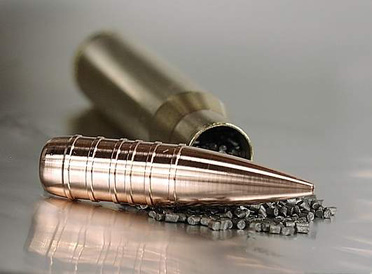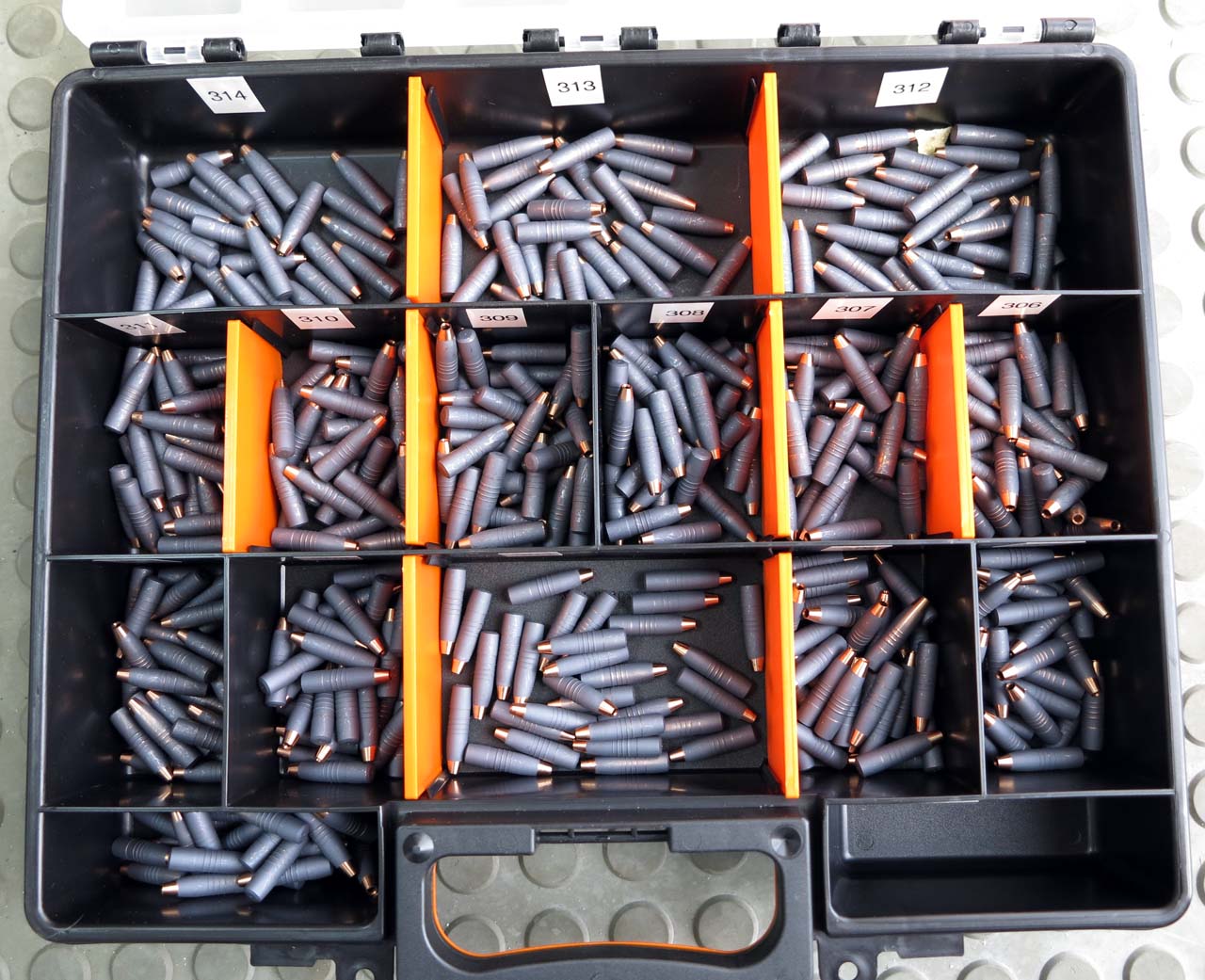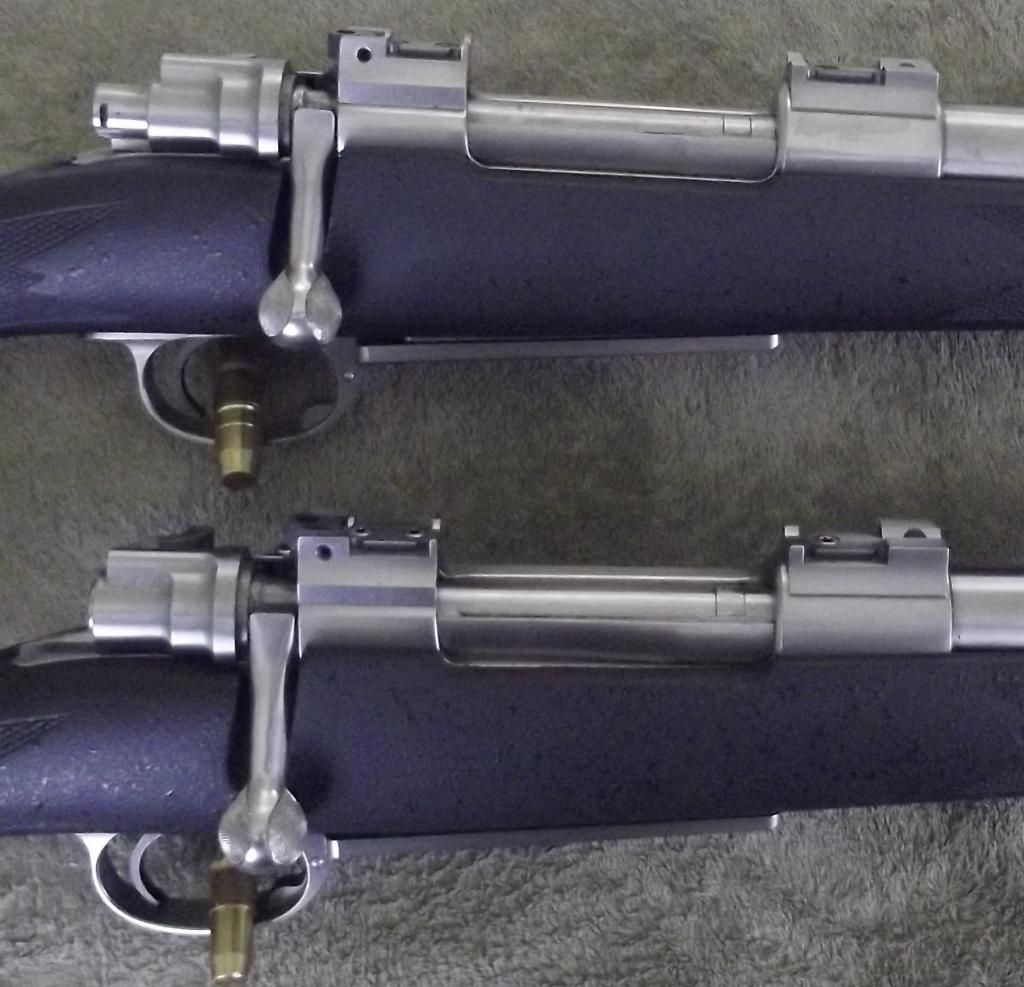

 The Accurate Reloading Forums
The Accurate Reloading Forums  THE ACCURATE RELOADING.COM FORUMS
THE ACCURATE RELOADING.COM FORUMS  Guns, Politics, Gunsmithing & Reloading
Guns, Politics, Gunsmithing & Reloading  Bullet Making
Bullet Making  Let Us Play An Interesting Game....
Let Us Play An Interesting Game....Go  | New  | Find  | Notify  | Tools  | Reply  |  |
| Administrator |
Many years ago, I had a .244 H&H magnum rifle, but had no 0.245 caliber bullets. I reloaded .243 bullets in it, which shot just as well, but the point of impact change a few inches. On another occasion, I was trying to load some funny ammo for Walter in his 7x64. I loaded .277 caliber bullets and shot them in the 7x64. They shot well enough for hunting!!?? So I thought I will try something, as I have the facility to do it. I have made a few bullets in each of the following size: 300 301 302 303 304 305 306 307 308 309 310 311 312 313 314 315. They are in our Walterhog design, and weigh - 308 caliber - about 160 grains. We are going to shoot them in 3 different rifles, and see what the results are going to be. Any guess as to where we will notice something is not right? | ||
|
| one of us |
OK, I'll play: 1) Below 0.304" and 2) Above 0.312" ________ Ray | |||
|
| One of Us |
My guess is that you will lose grouping ability at about .304" and chambering difficulty will show up at about .312". Now, if you outside trim the neck to allow the case to chamber, my guess then would be that you can get to the .312 with high pressure signs. | |||
|
| One of Us |
i'm gonna guess you'll lose accuracy below 302. and start seeing pressure increases above 311. this is in a 308 groove x 301 standard bbl. if you were using lead alloy i'd guarantee it. unless you are using black powder and soft lead then you can go down to .300. | |||
|
| one of us |
.304 .314  Doug Humbarger NRA Life member Tonkin Gulf Yacht Club 72'73. Yankee Station Try to look unimportant. Your enemy might be low on ammo. | |||
|
| One of Us |
You should probably slug the barrels of the test rifles so that the results show the bullet diameter variance from the barrel's diameter. _________________________________ AR, where the hopeless, hysterical hypochondriacs of history become the nattering nabobs of negativisim. | |||
|
| Administrator |
Here are our bullets ready for shooting. Roy is in the plane right now, arriving early this evening. He has been nominated to do the test - he doesn't know it yet, but Walter said Roy needs something to keep him busy!!? I think we might start with a Sako TRG-21 rifle. I will keep you all updated on our progress.  | |||
|
| one of us |
Well, nicely sorted out! This should be interesting. Does this mean that Roy is also going to have to do the handloading too? I am sure he would trust Saeed with that detail, but not Walter. Be careful that Walter has nothing to do with the handloading! | |||
|
| Administrator |
Roy and Rene arrived last night, so he should be starting this project this morning Roy does his own loading, and I do help him sometimes. Walter is not allowed to load anything. | |||
|
| Administrator |
We jst picked a recommended load from the powder can - Varget - and loaded our ammo. 46.0 gr Varget RWS 5341 primers RWS brass Walterhog 164 grain bullets Loaded round 2.800 inch. Groups are 5 shots at 100 yards. 0.308 0.791 2890 fps 0.307 0.717 2832 fps 0.306 0.874 2838 fps 0.305 0.974 2819 fps So far we do not see anything strange, as the results are very close. We are having a lunch break and will continue after that. | |||
|
| one of us |
Interesting velocity loss as the bullet gets looser fitting in the bore. Re. accuracy between .308 and .307: No statistical significance yet Velocity gains as bullet gets over-sized ... to a point, then kaboom? Comparing velocities and accuracy should be very interesting. Assume rifle has a a true .308" groove diameter? Tell Roy Vincent that Ron "The Unforgiven" Berry says "Hi." | |||
|
| Administrator |
46.0 gr Varget RWS 5341 primers RWS brass Walterhog 164 grain bullets Loaded round 2.800 inch. Groups are 5 shots at 100 yards. 0.308 0.791 2890 fps 0.307 0.717 2832 fps 0.306 0.874 2838 fps 0.305 0.974 2819 fps 0.304 0.680 2804 fps 0.303 0.922 2725 fps 0.302 2642 fps bullets scattered all over the place, becoming unstable and keyholing. | |||
|
| one of us |
Hi Saeed, Did you say what bore and groove diameters you got there? Previously known or have you slugged it yourself or did Roy slug it? This is very important information for the record, so ... Please do not allow Walter to slug your barrels! And give Rene Vincent a hug for me. Or you may allow Walter to do this for me. That should be pretty harmless on Walter's part, if Rene will allow it, under Roy's protective supervision. | |||
|
| Administrator |
The rifle is a Sako TRG-21, we have not slugged it, but will try to. Walter has already brought Rene flowers, gave her hugs and kisses right in front of Roy, who just smiled and "Dont attempt that with me!" | |||
|
| One of Us |
This IS interesting! I do know some folks getting good accuracy using .308" bullets in their 303Brit guns and I am going to try some .284s in my 280 Ross to see how it goes. Any opinions out there about creating a situation of excessive groove erosion from blowby? | |||
|
| One of Us |
I wonder whether that 0.68 group from the 304 is just an aberration from the trend. | |||
|
| One of Us |
I know from experience that 195 grain cast linotype bullets of .314" diameter can be fired through .308" groove diameter Hart barrels and shoot 5-shot 100-yard groups of 0.4" without exhibiting signs of excessive pressure. I also know that 144 grain Nato ammo with jacketed bullets averaging .305" diameter will shoot 10-shot possibles at 400 & even 600 yards with a 14" twist, but is not reliably accurate at 900 yards and beyond. (In British Commonwealth coutries, matches were commonly shot at 300, 400, 500, 600, 800, 900,and 1,000 yards before "metric" took over.) | |||
|
| Administrator |
0.309 0.945 2828 fps 0.310 0.670 2805 fps 0.311 0.508 2838 fps 0.312 0.633 2815 fps 0.313 will not chamber. We also tried shooting these in a custom rifle we have built ourseoves on a Remington 700 action. It has a Match Hart barrel, and chambered using a reamer made to minimum specs. THis rifle is used here in our shooting range by everyone, mostly using military ball ammo. The rifle has fired an incredible number of rounds, and the surface inside the barrel looks like an elephant skin! But, it still shoots very well. We all scratch our heads about this, as it goes completely against all what we have heard before. 0.308 0.820 2843 fps 0.309 0.869 2800 fps 0.310 0.626 2825 fps 0.311 wll not chamber. We decide not to shoot the rest, as results seemt o be so similar. I think for one to be able to shoot undersize or over size bullets depends on two factors. The relative bore diameter of the barrel, and how tight the chamber is cut. | |||
|
| one of us |
0.311" diameter bullet gave 0.508" 5-shot group at 100 yards. That is some good shooting, Roy or Saeed? Nerves of steel regarding kabooms, eh? And you only stopped shooting the over-sized bullets when you could not chamber them, not because your throat has only .3086" or .3090" diameter of freebore, but because the neck diameter of cartridge got too big, all stretched out by the fat bullets in the tight necks. Bigger cartridge neck than chamber neck. Neck diameter of chamber too tight. Nice ogive on those bullets, they wedge into the freebore nicely, or did they get shoved back into the case? No, neck was too tight to let loose of the bullet ... See if Walter will shoot the rest. Use hammer to close bolt. And barrels are truly .308" groove, eh? Before and after shooting all those undersized and oversized bullets? | |||
|
| Administrator |
Roy did all the shooting. There was no noticeable signs of pressure at all. | |||
|
| One of Us |
May I suggest that with turned case necks it may be easy to get cartridges with oversized bullets to chamber IF the throat is big enough in diameter. With my .30 BR rifle I had to go to .314" diameter bullets because the rifle was very innaccrate (.6"+ or so groups) with smaller ones. I asked the late multiple national record holder Larry Jennings to see if he could figure out why. In a few days Larry solved the problem. For some reason the 'smith (John Ardito, also a multiple national record holder) had cut the chamber with a .314" throat even though the groove diameter was a true .3080". By turning the case necks to .011" thickness, we got plenty of room to fit loaded cartridges into the chamber. And by using .314" bullets, we immediately reduced group size by over 33%, to .4" and below while using the same powder charge. The barrel of course still had .a .3080" groove diameter. | |||
|
| One of Us |
P.O. Ackley did some interesting experiments with oversize bullets. As I recall as long as the neck and throat would accommodate he encountered no pressure problems even with greatly oversize bullets. It would be interesting to repeat his work with a pressure barrel. C.G.B. | |||
|
| One of Us |
European practice in the late 1800s was to use a bullet a few thousandths of an inch smaller than grooove diameter with grooves about .006 inch deep per side. The undersize bullet would seal the bore due to displacement of metal by the rifling. Many of the 6.5mm cal rifles had .256 land dia, with .266 to .268 grove diameter. The ammo typically used .262 to .263 bullets. | |||
|
| One of Us |
Interesting project. Saeed tell us more about those bullets. What are the constructed of and what's the coating on them? P.O.Ackley also ran a 30-06 chamber reamer in a 6.5 Japanese Arisaka Type 38 and fired 30-06 ammo from it without blowing up the action. He said that after the initial swaging down and engraving of the bullet into the bore the pressure really wasn't that bad. | |||
|
| Administrator |
The bullets are turned on our CNC lathe. They are made of 100% copper, and the coating is molly. We are able to adjust the diameter of the bullet on our lathe, hence the idea to try this out. | |||
|
| One of Us |
I have noticed that many official "Spec" (CIP, SAAMI, etc) bullet/barrel designs allow massively smaller bullets than groove diameter - for safety reasons.... Generally, they never allow a fit that exceeds line to line... I suppose if you are a manufacturer - and concerned with liability or a Military and concerned with "Still Goes Boom when soldiers do dumb things".. you would do the same... But... That's not been my experience as to the recipe for accuracy... 1 question... I see you have driving bands on the bullets... and I am assuming that the driving band OD is the one you are sizing for final fit to the groove diameter... What is the major bullet diameter under the driving bands? With solids - we usually see HUGE pressure increases when you stuff them in past the driving bands into the solid copper parts... Thanks | |||
|
One of Us |
Saeed, What is the shank diameter of the bullets? Am I correct to assume shank diameter was the same for all bullets? Jim "Life's hard; it's harder if you're stupid" John Wayne | |||
|
| one of us |
This test would have been interesting with a strain gauge giving pressure readings. There is hope, even when your brain tells you there isn’t. – John Green, author | |||
|
| Administrator |
Yes, the shank is the same, but it never engages the rifling. The rifling is only engaged by the rings on the outside. | |||
|
| Powered by Social Strata |
| Please Wait. Your request is being processed... |
|
 The Accurate Reloading Forums
The Accurate Reloading Forums  THE ACCURATE RELOADING.COM FORUMS
THE ACCURATE RELOADING.COM FORUMS  Guns, Politics, Gunsmithing & Reloading
Guns, Politics, Gunsmithing & Reloading  Bullet Making
Bullet Making  Let Us Play An Interesting Game....
Let Us Play An Interesting Game....

Visit our on-line store for AR Memorabilia

